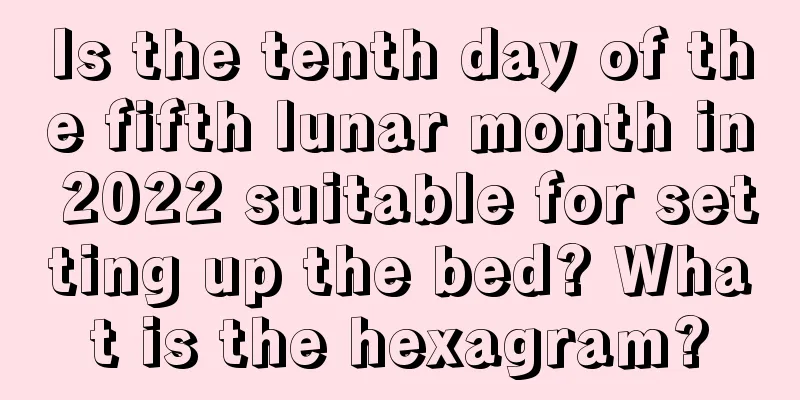Detailed explanation of the customs and taboos on the sixth day of the Lunar New Year

Introduction: How much do you know about the sixth day of the Lunar New Year? The sixth day of the Lunar New Year has many nicknames, including "Horse Day" and "The Day to Send Away Poverty". Why is there such a nickname? What are the traditional customs and taboos on the sixth day of the Lunar New Year? Now, please follow the editor to learn more about it! There is no end to the topics about the Spring Festival, so do you want to know more about it? Just continue to wander in Mr. Shui Mo’s Spring Festival special ocean!The sixth day of the Lunar New Year: FertilizerThe sixth day is the Horse Day, known as Yifei in ancient times. People really start working or doing business on this day. Since the beginning of the first month of the lunar year, the toilet cannot be cleaned until the fifth day, and feces accumulate in the toilet. So on this day, a thorough cleaning is done, and sacrifices are made to the toilet god to clean the usually dirty toilet. That’s why it’s called “挹肥” (but nowadays most families use new bathroom equipment, so this custom no longer exists). This day also represents the day when farmers in the old days began to go to the fields to prepare for spring ploughing. In Chinese folk beliefs, it is generally believed that the toilet god is Zi Gu, who is also known as Zi Gu, Toilet Gu, Mao Gu, Keng Gu, and Dong Shi Niang. Since the Ming and Qing Dynasties, Zi Gu is no longer simply a toilet god. People say that she can predict the future and has foresight. She is often worshipped at home and can predict various things, becoming one of the great gods who practice divination. The Hakka people commonly call the Zi Gu Goddess as Qijie or Qigu. On the sixth day of the first lunar month, the Hakka people worship Zi Gu after drinking milk. There are three meanings to this: first, to pray for a good harvest; second, to thank God for His grace; and third, to ask for divination of good or bad luck. After cleaning or sanitation of toilets and other sanitary places, Hakka women will light red candles or tea oil lamps in front of the door of the place, burn incense sticks to worship, and paste red paper on the lintel or door frame to indicate auspiciousness.The sixth day of the Lunar New Year: pray for good luck and get rid of the poor ghostThe sixth day of the first lunar month is the horse, which means sending away the poor ghost. Legend has it that the Goddess of Poverty was Jiang Ziya's wife. In order to prevent the Goddess of Poverty from entering their homes during the Spring Festival, people hang red notes on their doors to ward off her. At some point, Beijing's God of Poverty became a male and became the god worshipped by porters. On this day, housewives of the house have to throw out the garbage accumulated during the festival, which is called sending away the ghost of poverty. The hanging notes on the door can also be taken down and thrown out at the same time, which is called sending away the god of poverty. The most popular people on this day are boys who turn 12 years old that year. 12 is twice 6, which can be called a lucky number. It is also said that the God of Fortune Liu Hai is a Beijing native, a fat boy dressed in red and green. There is a folk saying that "Liu Hai plays with the golden toad and catches money at every step", and his image is very popular among citizens. Boys who are in their zodiac year, dressed with bangs, carry five little figures cut out of white or colored paper on their backs and go to the streets. Whoever grabs the figure is considered the God of Wealth, and the one whose figure is not grabbed is called the poor ghost. If two people who are both born in their zodiac year meet, whoever grabs the villain behind the other first will have good luck. There are also people who use small cloth bags to throw out as poor ghosts. Both parties have to carry a small basket behind their backs. The one who throws the small bag into the basket behind the other side first throws the poor ghost first, which is auspicious. Today's traditional national sport "hunting" developed from the game of "throwing the poor ghost and grabbing the god of wealth". Unfortunately, this activity still exists in Liaoning, but is rarely seen in Beijing. On that day, vendors go out on the street because it is the Horse Day, and the family should buy "Ludagun" for the "poor" boy to eat.The sixth day of the Lunar New Year: Good luck in opening the marketOn the sixth day of the Lunar New Year, shops and restaurants officially open for business, and firecrackers are set off, just as loudly as on New Year's Eve. The sixth day of the first lunar month was the day when all businesses, big and small, would "open for business" in the old days, and a big red couplet with the words "Good luck in opening the business, and everything will go well" would be posted on the door panels. Firecrackers are set off before opening to bring good luck. Some families find a "complete and charming person" (a woman with a husband, children, and parents-in-law) to go around each house and say auspicious words before opening the market on the sixth day of the Lunar New Year, such as "good luck in opening the market, more than enough blessings, everything will be safe, make more money, and earn enough gold and silver to fill a kang", etc. Before the market opens, it is taboo for women from other families to visit one's home. After the market opens, all Spring Festival taboos end, everything returns to normal, and neighbors can resume visiting and interacting with each other. Put one or more large pots of oranges in front of the stall. There must be a lot of oranges, otherwise there will be more empty spaces than oranges (homonymous in Cantonese as “凶多吉少”), which is a bad omen. In addition, according to the traditional custom of "3, 6, and 9, walk outside", people should go to parks and other places for fun on the 6th day of the Lunar New Year. If you consciously set your walking route in a circle while playing, it is said that this can bring good luck in the new year.Summary: The above article gives us a detailed introduction to the customs and taboos on the sixth day of the Lunar New Year. Everyone can learn about them, popularize the traditional customs and culture of the Chinese New Year, and experience the festive culture of the Chinese Spring Festival! After reading this article, there are more exciting content in the Spring Festival special topic, let’s take a look! |
<<: Peace is a blessing, these Feng Shui items can ensure peace!
>>: When is the beginning of spring in 2017?
Recommend
Is February 18th of the lunar calendar in the Gengzi Year of 2020 suitable for funerals?
Is February 18th of the lunar calendar in the Geng...
Is the sixth day of the fourth lunar month in 2020 a good day? Can I pray?
The quality of days is different every day, and it...
Is May 23rd of the lunar calendar in 2019 a bad day? Is it a good idea to burn incense and worship Buddha?
Going to the temple to burn incense and pray is a ...
Are people born on the fifth day of the sixth lunar month in 2020 a Leo? How is your fortune?
The fortunes of different constellations are also ...
What is the fate of a girl born on the 13th day of the ninth lunar month in 2022? OK?
What is the fate of a girl born on the 13th day of...
What day is the 25th day of the first lunar month in 2018? What month and date is it?
What day is the 25th day of the first lunar month...
Is March 12th of the lunar calendar in 2021 a bad day? Can we get married?
The third month of the lunar calendar is the third...
What are the auspicious and inauspicious things about March 22, 2020 in the lunar calendar?
The lunar calendar is different for different day...
Is it possible to move to a new home during the Bailu period in 2018? Ten Do's and Don'ts of Moving
Every day has good and bad days, auspicious and in...
Is the second day of the eighth lunar month in 2019 an auspicious day for a haircut?
The eighth month of the lunar calendar is the seco...
Can I get married on September 18th of the lunar calendar in 2018?
Want to know more about the days in the ninth mon...
Is it a good idea to propose on the ninth day of the seventh lunar month in 2022? What is the hexagram for this day?
The seventh month of the lunar calendar is the fir...
What day is August 20th in the lunar calendar in 2019? Can I travel?
my country uses both the lunar calendar and the so...
Is the 24th day of the 10th lunar month in 2019 a good day? Check the auspiciousness and inauspiciousness at 12 o'clock today!
Introduction: Every day has good and bad luck, and...
Is it okay to get engaged on July 16th, the day of the Beginning of Heat in 2021? What's the omen for this day?
July is coming in early autumn. Do you want to kno...









